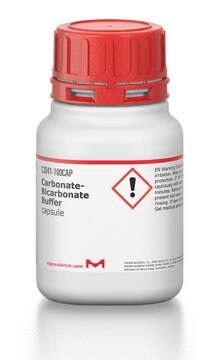S4019
Sodium bicarbonate
Hybri-Max™, powder, suitable for hybridoma, ≥99.5%
Synonym(s):
Sodium hydrogen carbonate
About This Item
Recommended Products
grade
Hybri-Max™
Assay
≥99.5%
form
powder
technique(s)
cell culture | hybridoma: suitable
impurities
endotoxin, tested
pH
8.3 (0.1 molfreshly prepared)
pKa (25 °C)
(1) 6.37, (2) 10.25 (carbonic acid)
solubility
water: soluble 100 mg/mL
density
2.16 g/mL at 25 °C (lit.)
SMILES string
[Na+].OC([O-])=O
InChI
1S/CH2O3.Na/c2-1(3)4;/h(H2,2,3,4);/q;+1/p-1
InChI key
UIIMBOGNXHQVGW-UHFFFAOYSA-M
Looking for similar products? Visit Product Comparison Guide
Application
- in minimum essential medium (MEM)/flushing medium for embryo isolation
- in TCM 199 medium for the collection of cumulus-oocyte complexes (COCs) and in vitro maturation (IVM)
- in IVM medium for in vitro maturation of COCs
Biochem/physiol Actions
Legal Information
Storage Class Code
13 - Non Combustible Solids
WGK
WGK 1
Flash Point(F)
Not applicable
Flash Point(C)
Not applicable
Personal Protective Equipment
Certificates of Analysis (COA)
Search for Certificates of Analysis (COA) by entering the products Lot/Batch Number. Lot and Batch Numbers can be found on a product’s label following the words ‘Lot’ or ‘Batch’.
Already Own This Product?
Find documentation for the products that you have recently purchased in the Document Library.
Customers Also Viewed
Our team of scientists has experience in all areas of research including Life Science, Material Science, Chemical Synthesis, Chromatography, Analytical and many others.
Contact Technical Service





